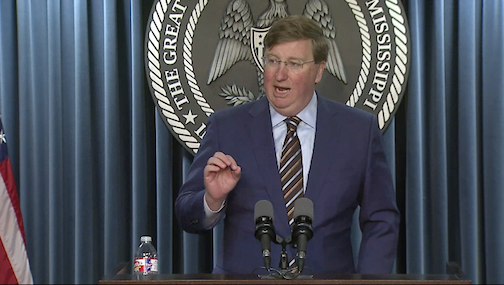Reeves calls Mississippi special session for jobs project
Published 4:30 pm Monday, October 31, 2022

- Screen capture of Governor Tate Reeves speaking during a press conference on Wednesday, August 3.
JACKSON, Miss. (AP) — Mississippi Gov. Tate Reeves is calling lawmakers into special session Wednesday to consider incentives for an economic development project that he said would create 1,000 jobs with an average salary of $93,000.
“Biggest economic development project in MS history coming to Golden Triangle,” the Republican governor wrote Monday on social media.
Reeves said in a news release that the company would make a $2.5 billion investment, but he did not name the company. He said the project includes “a flat-rolled aluminum production facility, biocarbon production facilities and certain other industrial facilities.”
The governor did not immediately say what kind of incentives he will ask the Republican-controlled Legislature to approve. The special session will begin at 10 a.m. Wednesday.
The Golden Triangle is in the northeastern part of the state, near the Alabama border. It encompasses Columbus, Starkville and West Point.
Democratic Rep. Kabir Karriem of Columbus told The Associated Press that the project will be for Lowndes County.
This will be the first special session of the year for Mississippi legislators, who met in regular session from early January until early April.
“The Mississippi Legislature has helped us build a business climate that encourages economic growth,” Reeves wrote.
Mississippi is one of the poorest states in the U.S. According to the Census Bureau, the average per-capita income in the state was $25,444 from 2016 to 2020, compared to the U.S. average of $35,384.
The governor’s news release said that the jobs for this project will be more than double the existing average salary in Mississippi.
“One of my top priorities will always be to raise the per capita wages of Mississippians,” said Reeves, who is expected to seek a second term next year. “This historic economic development deal does exactly that and will have a remarkable impact on communities across Mississippi.”





